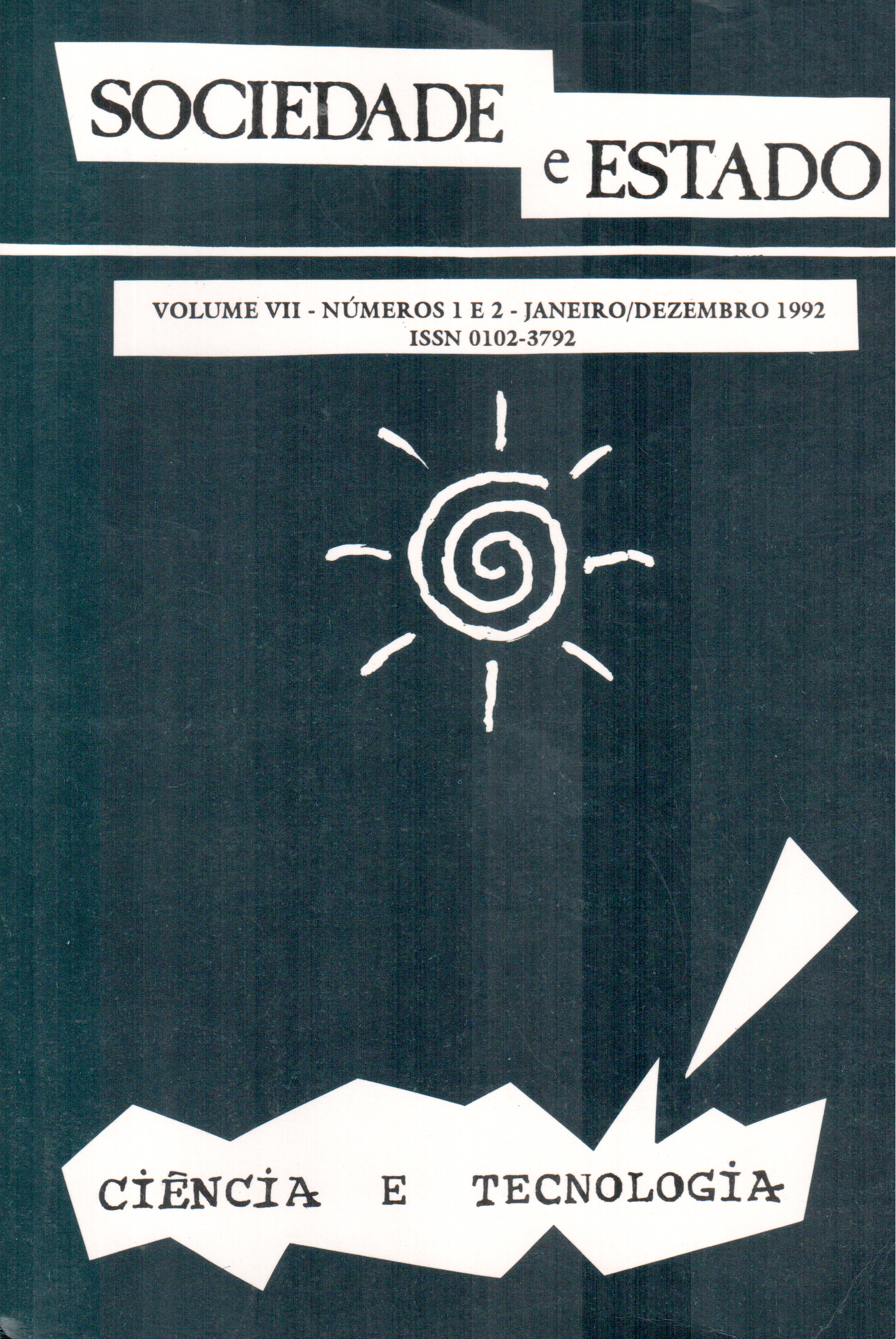Indicadores de C&T e seu uso em Política Científica
Palabras clave:
.Resumen
Este artigo apresenta uma reflexão sobre o uso que os indicadores quantitativos de C&T têm tido para a tomada de decisão em políticas para o setor. Para isto, são mencionadas, de maneira suscinta, as principais iniciativas no sentido de compilar informações e produzir indicadores em alguns países. Em seguida, apresenta-se uma série de evidências de que, até o presente, os órgãos responsáveis pela política de C&T nos diversos países têm feito muito pouco uso desses indicadores. Aí principais razões para este fato são, então, apontadas e discutidas. Finalmente, são feitas algumas considerações de ordem geral que deveríam ser observadas para que seja possível aproximar os produtores de indicadores dos tomadores de decisão.
Referencias
ARREGUI, P., .’Regional Databases and S&T Development
Indicators: Problems, Achievements and Utilization of GRADE’S Latin
American Database”, in R.Arvanitis 8c J.Gaillard (eds), Science
Indicators for Developing Countries. Paris: Editions de l’ORSTOM, pp.
- 601, 1991.
BOND, J.S., ..The Challenges of Quantifying the S&T Enterprise,
in M.O.Meredith etal, AAAS Science and Technology Policy Yearbook.
Washington DC: AAAS Press, pp.279-283, 1991.
CALLON, M.;J. LAW&A. RIP. Qualitative Bibliometrics. New York:
Macmillan, 1986.
CHUBIN, D.E., “Research Evaluation and the Generation of Big
Science Policy”, Knowledge: Creation. Diffusion. Utilization, vol 9, na
, pp.254-277, 1988.
CHUBIN, D.E. 8c E.J. HACKETT, Peerless Science. Albany: State
University of New York Press, 1990.
CHUBIN, D.E. &E.M. ROBINSON, “Data on the Federal Research
System in the United States”, Knowledge: Creation. Diffusion.
Utilization, vol. 1 3, ns 1, pp.49-78, 1991.
DE HEMPTINNE, I.P.S.A. & J. MBA-NZE, “The Measurement of
National Scientific and Technological Potential for Policy-Making
Purposes”, in R.Arvanitis 8c J.Gaillard (eds), Science Indicators for
Developing Countries. Paris: Editions de l’ORSTOM, pp. 619-630,1992.
PRAME, J.D., “Science Indicators in Science Policy Formulation”,
Scientia Yuguslavica, vol.6, pp.67-73, 1980.
HALL, N., “SERC Ignores the UGC Ranking”, Times Higher
Education Element, vol.9. pp. 5-7, 1987.
HOLMFELD, J.D., “Broadening the Use of Quantitative
Information in Science Policy”, in M.O.Meredith et al, AAAS Science
and Technology Policy Yearbook. Washington DC: AAAS Press, pp.285-
, 1991.
IRVINE, J. 8c B. MARTIN, “Es Possible Valorar la Investigación
Pura?”, Mundo Cientifico, vol. 12, na 11 , pp. 162-195, 1982.
IRYINE, J. 8c B. MARTIN, “Assessing Basic Research: the Case of
the Isaac Newton Telescope”, Social Studies of Science, vol. 13, pp.49-86,
IRVINE, J. 8c B. MARTIN, ..Basic Research in the East and West: a
Comparison of the Scientific Performance of High-Energy Physics Accelerators”, Social Studies of Science, vol. 1 5, pp.293-341, 1985.
IRVINE, J.; B. MARTIN & G. OLDHAM, “Research Evaluation in
British Science: a SPRU Review”, SPRU, Sussex University, Occasional
Paper, mimeo, 62p, 1983.
MARTIN, B. &J. IRVINE, “Assessing Basic Research: Some Partial
Indicators of Scientific Progress in Radioastronomy”, Research Policy.
vol. 12, pp.61 -90, 1983.
MARTIN, B. & J. IRVINE, “CERN: Past Performance and Future
Prospects -I. CERN’s Position in World High-Energy Physics”, Research
Policy, vol. 13, pp. 183-210, 1984.
NEDERHOF, A.J. & A.PJ. VAN RAAN, “The Use and Development
of Science and Technology Indicators for Policy Making in Five
Countries: a Comparison”, in A.EJ. van Raan; AJ.Nederhof 8c H.F.Moed.
Science and Technology Indicators. Their Use in Science y and Their
Role in Science Studies. Leiden: DSWO Press, pp. 193-211, 1989.
NOONAN, N.E., “Compiling Data on Science and Engineering for
the US Budget”, in M.O.Meredith et al, AAAS Science and Technology
Policy Yearbook. Washington DC: AAAS Press, pp.303-305, 1991.
OFFICE FOR TECHNOLOGY ASSESSMENT, “Research Funding
as an Investment: Can We Measure the Results? -A Technical
Memorandum”, Washington, DC: U.S. Congress, OTA-TM-SET-36, 1986.
PAVITT, K., “The Size and Structure of British Technology
Activities: What We Do and Do Not Know”, Scientometrics. vol.14,
pp.329-346, 1988.
PHILLIMORE, A.J., “University Research Performance Indicators
in Practice: the University Grants Committee’s Evaluation of British
Universities,1985-86", Research Policy, vol.18. pp. 255-271, 1989.
RIP, A. &J. P. COURTIAL, “Co-word Maps of Biotechnologies: an
Example of Cognitive Scientometrics”, Scientometrics. vol.6, pp.381
, 1984.
RONAYNE.J., “Indicators and Outrage: Assessing Basic Research”,
Metascience, vol.3. pp.32-44, 1985.
VAN SPIEGEL, E., “A Policy View on Science and Technology
Indicators”, in A.FJ. van Raan; AJ.Nederhof & H.F.Moed. Science and
Technology Indicators. Their Use in Science Policy and Their Role in
Science Studies. Leiden: DSWO Press, pp.9-15, 1989.
WADE, N., .’Citation Analysis: a New Tool for Science
Administrators”. Science, vol.188 (2 de maio), pp.429-432, 1975.
Descargas
Publicado
Número
Sección
Licencia
Derechos de autor 2022 Revista Sociedade e Estado

Esta obra está bajo una licencia internacional Creative Commons Atribución-NoComercial 4.0.











